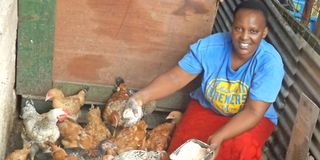Sasso, queen of eggs and meat, is my moneymaker

Salome Nyaga feeds her Sasso chickens in Mombasa. She says the chickens offer her good income from both their eggs and meat.
What you need to know:
- The chicken is easy to keep since it is less affected by diseases and can be kept under free-range system since they are good scavengers.
- The birds exist in several colours and start laying eggs at five months. However, one of its disadvantages is that it has a slow growth rate.
- The Sasso chicken can be a game-changer in one’s financial status. When well-kept, they are not attacked by diseases and sick, they respond well to treatment and the mortality rate is low.
- During vaccination, farmers should not to mix vaccines with borehole or disinfected water since it affects the efficacy.
Gospel singer Salome Nyaga rears Sasso chickens in Miritini-Vikobani, Mombasa County. She explains to Bozo Jenje why she keeps this breed that is also known as the queen of eggs and meat and what she has learnt from poultry farming
Why poultry agribusiness?
Salome Nyaga: I went into commercial poultry keeping in late 2019 to generate income after quitting my job.
My employer gave me unrealistic target that I could not meet, thus, for my own peace of mind, I left. I had saved some money which I ploughed into the poultry business.
But I did research and came across the Sasso broiler breed, whose origin is France, which impressed me with its attributes. I decided to go for it.
Talking of qualities, what did you find about the chicken that you did not see in the other breeds?
Salome Nyaga: The first thing I learnt is that the birds produce more eggs, up to 240 a year, and has quality meet.
The chicken is also easy to keep since it is less affected by diseases and can be kept under free-range system since they are good scavengers.
The birds exist in several colours and start laying eggs at five months. However, one of its disadvantages is that it has a slow growth rate.
But this is not a bad thing per se because the slow growth strengthens their muscle development.
Where did you source the birds because not many farmers keep them around?
Salome Nyaga: Initially, I kept indigenous chicken, which helped me learn the ropes of poultry agribusiness.
But I sold them at between Sh800 to Sh1200 before I moved to Sasso, which I sourced from a farm in Tanzania through an agent in Meru, who transported them to Mombasa by bus.
When the chicks arrived, I had not even constructed a good poultry house for them, so I set a section in my sitting room.
I fed them chick mash, liquid paraffin to boost food intake, glucose and water. I also offered them supplemental heat using a jiko to keep them warm.
I vaccinated them against New castle and Gumboro. Out of the 100 chicks, three died. I sold 39 of the birds at Sh550 each at three months when the Covid-19 pandemic struck, affecting access to feeds.
I now have 120 birds, some having hatched chicks recently.
You sang the hit Mungu si mwanadamu, how do you balance between singing and poultry keeping?
Salome Nyaga: I have a schedule that I follow. Monday to Wednesday I take full charge of their management and between Thursday to Sunday, I leave them in the hands of my worker.
I am not only a singer and poultry farmer, but also a mother to Edna and Everlyne Wendo.
How many eggs do you collect every day and do you sell them?
Salome Nyaga: I collect at least 50 eggs a day and sell each at Sh 20. The feeding costs come to Sh4,500 a month; it is not a very bad business.
The chickens are a blessing because they offer me good income from the eggs and meat. I feed them the commercial feeds but also supplement with vegetable waste I collect from vendors.
My main aim is to become a supplier of day-old chicks and an eggs distributor.
What lesson have you learnt since you started keeping the birds?
Salome Nyaga: The Sasso chicken can be a game-changer in one’s financial status. When well-kept, they are not attacked by diseases and sick, they respond well to treatment and the mortality rate is low. I have kept various birds but the Sasso stands out.
What should one consider before selecting a chicken breed?
Juma Muthoka, a veterinarian: For good growth, breed selection and proper feeding is necessary. Feeds should have the right nutrition value for faster growth of the chicken.
Consider the source of the chicks to avoid bringing diseases to your farm. Second, the birds should have a growth rate and resistant to diseases.
During vaccination, farmers should not to mix vaccines with borehole or disinfected water since it affects the efficacy.





